
In our latest post, Rosanne Werner discusses her award-winning approach to digital transformation in enterprise. Rosanne draws on psychology, organisational behaviour, and change management initiatives to improve the adoption and impact of data and AI technologies at scale.
Rosanne’s approach emphasises the often-overlooked human element when adopting a data strategy, embedding data driven decision-making into company culture. The key to successful AI integration, Rosanne explains, lies in bridging the gap between technology adoption and real cultural change:
During my 10-year tenure at Coca-Cola Europacific Partners, I had the privilege of leading the Data in Action programme – a multi-award recognised Data and AI Mindset and Culture initiative. This programme employed a multi-touch approach that empowered participants to turn data into insights for action.
Coca-Cola Europacific Partners wants to be the best at using data: adopting new data products, asking the right questions, telling stories with data. It’s set an ambition to become a data-guided company. Crucial to that is to have the right mindset, one that knows how to use data.

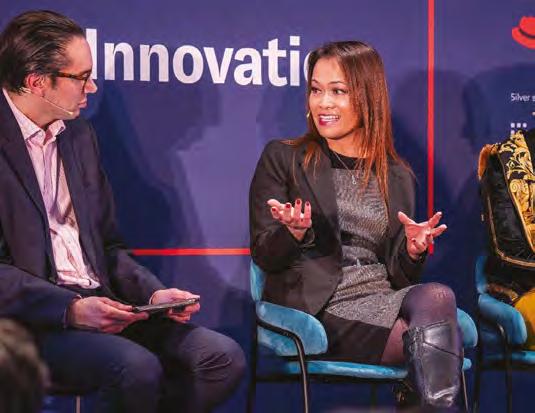
The programme reached over 2,000 data catalysts across different functions and territories around the globe. This vibrant and engaged data catalyst community was a key cornerstone of the programme’s success. By equipping the data catalysts with a unified data strategy vision – essentially giving them the same ‘hymn sheet’ – we leveraged their diverse backgrounds and extensive organisation reach. This approach helped raise the awareness of our cohesive data strategy and drive large-scale mindset and cultural transformation.
Most significantly, these data catalysts generated a powerful ‘pull’ effect throughout Coca-Cola. They challenged the status quo and championed the desired data habits, behaviours and mindset. They led change daily by inspiring their teams to build data fluency and adopt data-first decision-making.
The Data in Action programme was recognised in the DataIQ Best Data Academy or Skills Development Programme Category, as well as IDC Foundry’s CIO 100 Awards.
Leaving behind the legacy built at Coca-Cola was not an easy decision, but it was one driven by the inner desire to create an even greater impact and support more organisations on their transformation journey. My time at Coca-Cola provided invaluable experience in data-driven strategies, innovation, and large-scale business transformation.
However, throughout my journey, I recognised a critical gap that many organisations face – bridging the divide between technology adoption and real cultural and mindset change. To o often, businesses invest in data and technology solutions without embedding them into their organisational DNA, leading to missed opportunities and unrealised potential.
XcelerateIQ Limited was born from this realisation. I wanted to take my expertise and apply it across multiple industries, helping businesses unlock opportunities through data and decision intelligence, digital transformation, and strategic insights.
We focus on embedding data-driven decision-making into mindsets, processes, and company culture. By integrating the technical what with the human how , we ensure that investments in data and technology deliver real, sustainable value.
On a personal level, this transition also meant embracing entrepreneurship – stepping outside the comfort of a corporate structure and taking the risk to build something that can accelerate meaningful change on a larger scale – empowering teams, fostering data cultures, and ensuring that transformation efforts lead to sustainable, measurable impact.
Through years in the transformation space, I’ve observed a consistent pattern: while organisations invest heavily in data and technology, they often struggle to realise the full value of these investments.
The critical human element is often overlooked. This creates a two-fold challenge: teams struggle to use new technical capabilities while simultaneously unable to embed these tools into their daily workflows.
This leads to strong cultural resistance that runs deeper than simple change aversion. The main challenge isn’t primarily about tools or technology – it’s about fundamentally changing how people work, think, and act.
The usual data literacy programmes tend to fall short as it’s not just about one-off learning modules or workshops. It’s about building confidence in handling and interpreting data, developing fluency through regular practice and application, changing habits and behaviours to embed data into daily routines, and creating environments where data-driven decisions are expected and valued.
Martec’s Law perfectly captures the central challenge in data and digital transformation. It illustrates how technology advances exponentially while organisations can only change logarithmically. This creates a widening gap that many companies struggle with.
Martec’s Law highlights the critical need for organisations to develop strategies that enable faster adaptation to technological change while recognising the inherent limitations of organisational transformation speeds – particularly the time required for shifts in behaviour, culture, and processes.
This requires a balanced approach – one that integrates technological advancements with cultural and operational readiness. Rather than pushing technology faster – which often leads to resistance and failed initiatives – it means creating strategies that work with human nature rather than against it, helping organisations absorb change more effectively.
For example, when implementing new data tools, we break down adoption into manageable steps, integrating it with existing workflows, ensuring educational resources are always accessible and establishing peersupported systems. This approach helps organisations navigate change at a sustainable pace while maximising the value of their technology investments.
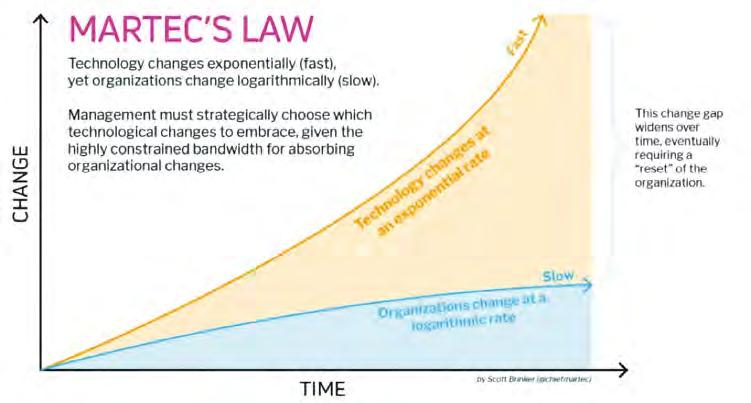
Traditional one-off training rarely leads to lasting behavioural change. My approach focuses on three key elements that align with how our brains naturally learn and adapt:
LEARNINGS THAT STICK
First, we create ‘Learnings that Stick’ through microlearning approaches. These bite-sized, interactive sessions provide immediate feedback and regular reinforcement through practical application. We incorporate gamification elements like quizzes, polls, leaderboard points and badges to make learning more engaging and memorable.
LEARNING BY DOING
Second, we emphasise ‘Learning by Doing’ through hands-on activities that integrate data and AI tools into daily work routines. This practical application helps embed new skills and behaviours through repeated use.
LEARNING WITH OTHERS
Third, we facilitate ‘Learning with Others’ through peer-to-peer activities across functions and territories. This creates a supportive community around data usage, encouraging the sharing of insights and best practices. The community aspect helps sustain long-term change in organisational behaviour.
People are complex beings shaped by their experiences, habits, and existing ways of working.
Our approach starts with understanding current data and AI behaviours within teams – how they interact with data, their decision-making patterns, and any underlying resistance or cultural factors. We also consider previous experiences with technology changes, areas of concern or scepticism, and the overall level of trust in data and systems.
We examine how teams currently collect, store, and share data, their ability to interpret and use data, and the frequency and depth of data usage in daily operations. We look at key decision points in core business processes, the balance between intuition and data-led decisions, and the speed and effectiveness of decision processes.
This understanding allows us to identify both barriers and enablers, helping us prioritise initiatives and tailor solutions that leverage existing positive practices and attitudes.
By recognising underlying resistance, cultural backgrounds, and past experiences with technology, we can design interventions that address concerns directly and build trust in data-driven approaches.
This ensures that change initiatives work with natural human tendencies rather than against them, fostering adoption and utilisation of data and digital investments. By embedding data and AI into everyday workflows in a way that aligns with how people naturally work, organisations can realise the full potential of their data and digital investments – enabling better-informed decisions, fostering innovation, improving performance, and ensuring a sustainable long-term impact.
The biggest mistake organisations make is treating the human element as an afterthought. People are at the heart of any transformation, and they can’t change overnight. The people engagement needs to run in parallel with technical implementation – not as a separate stream that comes later.
Organisational attitudes, behaviours and culture are listed high on the greatest challenges in the CD(A)O role per the latest AWS CDO Agenda Report:
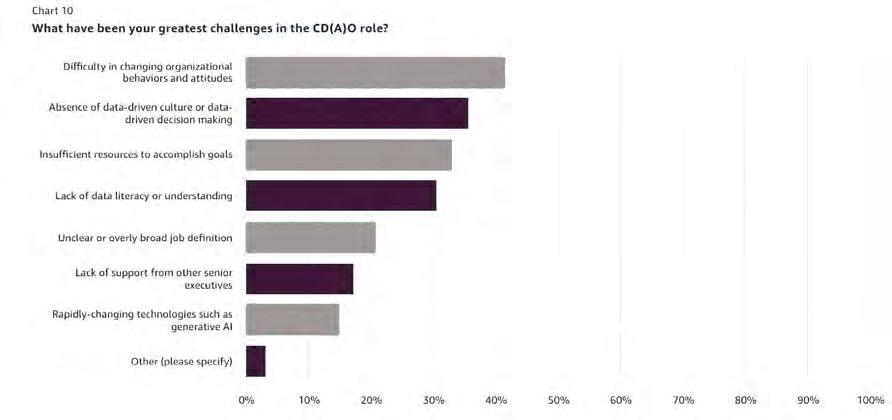
AWS CDO Agenda 2024: Navigating Data and Generative AI Frontiers
Drawing from my experience leading global transformations, particularly at Coca-Cola Europacific Partners, there are three key elements that have been critical for large-scale transformation success:
Every aspect of the transformation should prioritise user experience:
Achieving meaningful change requires building a strong community of catalysts who:
Leaders play a crucial role in:
By incorporating the human element from day one, you create an environment where change feels natural rather than forced. This approach has consistently delivered better adoption rates and more sustainable outcomes in my experience.
Successful transformation isn’t about pushing people to change – it’s about creating conditions where change becomes the path of least resistance. When people see the benefits, have the right support, and feel part of the journey, they become active participants rather than passive recipients of change.
AI integration presents enormous potential, but many organisations underestimate the challenges that come with it. It’s more than just implementing the latest capabilities – it’s a fundamental shift that requires the right foundations and sustainable strategies. Organisations must take a structured approach, ensuring their data, people, and strategy are aligned to ensure effective adoption and utilisation that brings real value in return.
AI implementation must solve real business problems rather than chasing the latest shiny tools. Organisations need clarity on value creation – identifying specific business challenges AI will address, defining how success will be measured, and calculating expected returns on investment.
The implementation strategy must be equally clear. Organisations should assess whether AI is truly the most effective solution, what resources and timelines are required, and how progress will be tracked and adjusted. This prevents organisations from pursuing AI simply because it’s trendy or because competitors are doing it.
Many organisations dive into AI without a proper data infrastructure, leading to the classic ‘garbage in, garbage out’ scenario. There needs to be a solid foundation in both data quality and governance. This means establishing clear ownership and accountability across the organisation, implementing robust quality control measures, and creating accessible, well-documented data systems that build trust.
The infrastructure must support these ambitions. Organisations need to assess their current data architecture, ensure scalable storage and processing capabilities, implement proper security measures, and create seamless data integration workflows. Without this groundwork, even the most sophisticated AI solutions will struggle to deliver value.
Organisations need a comprehensive people strategy, starting with strong leadership alignment. Senior leaders must actively champion the change, clearly communicate the AI vision and benefits, and demonstrate visible commitment to supporting the transition through regular team engagement.
Cultural transformation requires building AI fluency across all levels. Addressing fears and misconceptions early, creating engaged and active communities of practice, and celebrating early wins all contribute to sustainable adoption. Success stories should be shared widely to build momentum and demonstrate practical and relevant real-world impact.
Organisations that tackle these challenges systematically are far more likely to succeed. They create sustainable AI transformations that deliver measurable business value rather than just implementing technology for technology’s sake.
Effective AI integration requires careful preparation, continuous adjustment, and unwavering focus on both technical and human elements
With AI developing at such a fast rate, many are experiencing ‘AI fatigue’ – overwhelmed by the constant influx of new tools, ever-increasing capabilities, and the pressure to keep up. But the key to navigating this shift isn’t about resisting AI or blindly adopting it; it’s about developing an AI Mindset – one that sees AI as an enhancer of human potential rather than a replacement.
Companies must be intentional about integrating AI in ways that elevate human capabilities rather than erode or diminish them.
One key strategy is mapping the AI impact and how this redefines roles. AI should take on data-heavy tasks like processing, pattern recognition, and automation, while humans focus on areas where we excel: strategic thinking, emotional intelligence, and complex problem-solving.
Complementary workflows that incorporate AI for efficiency while maintaining human oversight ensure an effective partnership between technology and human expertise. AI can generate insights and options, but human judgment must guide decisions.
We should celebrate the unique human elements that AI complements but cannot replicate – our creativity, curiosity, critical thinking, adaptability, collaboration, and communication must be prioritised as core competencies.
Organisations should encourage and nurture a culture of experimentation, encourage cross-functional collaboration, and invest in developing these skills through training and leadership initiatives. Recognising and rewarding these abilities reinforces their value alongside AI capabilities. These are the skills that AI can support but never replicate, and they will define the next generation of high-impact, AI-empowered organisations.
Driving people change is one of the greatest challenges in any data and digital transformation. While technology can be implemented relatively quickly, shifting mindsets, behaviours, and ways of working takes time and deliberate effort. We need to approach this with the right mindset – one that places people before technology. Ensuring employees feel supported and empowered as new tools are introduced is critical. Without this, even the most advanced solutions will struggle to deliver meaningful impact due to lack of adoption and utilisation.
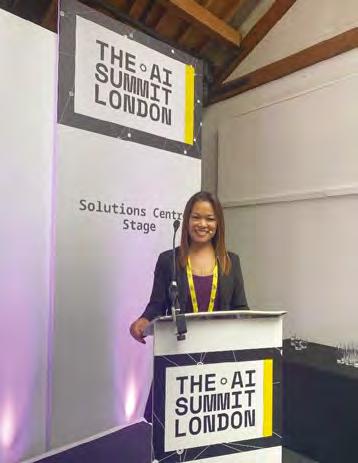
Sustainable change is built through small, consistent actionable steps. Embedding transformation into daily routines, reinforcing new skills, habits and behaviours through micro-learning moments, and fostering strong peer networks all help to accelerate adoption at scale. Regular check-in feedback loops, open and safe communication channels, and celebrating progress and achievements – no matter how small – help maintain momentum and engagement.
Measuring progress effectively is just as important as setting ambitious goals. Organisations should track both technical advancements and shifts in behaviour to gain a holistic view of success. Gathering continuous feedback ensures that strategies remain relevant and adaptive, while celebrating incremental wins keeps teams engaged and motivated.
Ultimately, data and digital transformation is not a one-off initiative but an ongoing journey. We need to remember to place people at the heart of the journey, commit to continuous learning, and measure what truly matters to ensure that data and technology empower and serve people.
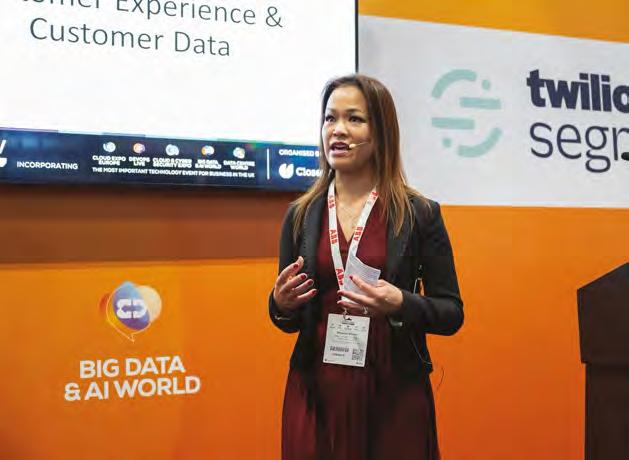
By integrating the technical what with the human how , we ensure that investments in data and technology deliver real, sustainable value.